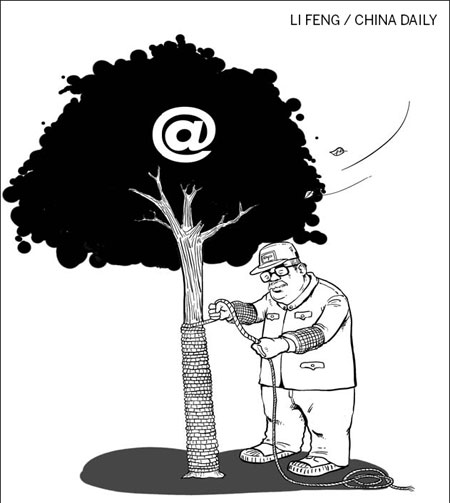Rules will help weibo develop well
- By Yu Guoming
 0 Comment(s)
0 Comment(s) Print
Print E-mail
China Daily, December 22, 2011
E-mail
China Daily, December 22, 2011

Micro-blog, better known as weibo among Chinese, made its debut in China in 2009 and already has more than 200 million registered users, reflecting the many changing aspects of Chinese society.
According to Renmin University of China's statistics, weibo was the third most socially influential communications platforms in China in 2010 and accounted for 12-13 percent of the subjects that became public issues. This year, thanks to its efficient information-sharing platform, weibo could become the second most or even the most socially influential communications platform and double its contribution to matters of public concern.
Each piece on weibo usually has 140 words, which are just enough to form a short message but, as it has turned out, can be of great social influence. In fact, this can be attributed to its characteristic dissemination mechanism.
Different from some point-to-point communications media such as instant messengers, weibo can reach a much wider range of users, because everyone can spread information and reach their support groups. Everyone can be the source, messenger and follower at the same time, and the wide participation of social members from different sectors, grassroots or elite, can even decide which direction a matter of public concern moves forward.
Victims of the forced demolition case in Yihuang, Jiangxi province, in 2010, for example, resorted to the unconventional way of defending their rights and interests by engaging public attention and exerting public pressure via weibo.
But information dissemination via weibo is not a one-way and one-off issue but completed through a micro-bloggers interrelation network. At the beginning, a micro-blogger posts information - a short message, a picture or even a link - and shares it with his/her followers, but this is not the end of dissemination. Other micro-bloggers will forward the information that they think is worth sharing with their own followers, thus creating some fission-like dissemination effect.
Also, unlike the conventional way of disseminating information from one person to another, micro-blogging coveys more than just message content. It entails the trust between the micro-bloggers and their followers, making the information more trustworthy and creditable. Thanks to the above three characteristics, weibo has enriched the soil for expression of public opinions in Chinese society over the past two years.
Besides its social value, weibo also has its commercial value, too. But it is not easy to develop weibo's features for better commercial use. Take the language style of weibo for instance. Weibo is indeed a one-to-n (where 'n' can represent infinity) communications media, which is of great sales and marketing potential, but it is still a highly personalized and affective one.
Commercial micro-blogging can hardly harvest expected results unless it succeeds in bringing up some emotional resonance within the character limit with the micro-bloggers, the potential customers.
It should be noted that the commercial activities could undermine the value of weibo. The problem does not lie in the commercial use of weibo per se but the lack of regulation on such commercial use. After all, weibo is an emerging communications media and can be easily put to unscrupulous use. For example, the companies that organize online-market promotion by controlling a large number of weibo IDs and post messages should at least make netizens aware of the process.
As for organizations and companies that register weibo accounts with commercial purpose, their micro-blogging behaviors can affect the regular communications. For instance, as weibo gains popularity, companies are increasingly relying on marketing through it.
Some have even brought in artificial followers to inflate the number of followers of their weibo accounts and employed "water armies", the hordes of people who are paid to post comment to influence public opinions and spread rumors to attack their competitors.
That is why it is important that even commercial artificial followers reveal their identity to the public instead of registering under a fake name, or else commercial manipulation under the pretense of public opinions can actually ruin the trust in weibo.
After the rapid development in the past two years, weibo will see further growth in the next few years, engage a wider range of users and see fierce competition among micro-blogging service providers in China. Should the first round of competition center on weibo's basic function, the next round of competition will extend to the development of plug-in software, which have more personalized functions and will make users life more convenient.
That is because weibo users will not be satisfied with the basic function of information sharing and interaction, and will increasingly use weibo as a personal development platform that combines work and daily life. Personalized plug-in software on weibo can meet their need, and the development of such software calls for better integration of its social and commercial elements.
Considering the prospects for weibo, its development will inevitably face some challenges, both socially and commercially, but it is worth striving for and calls for practical and tolerant approaches and concerted efforts by different sectors.
The author is a professor at the School of Journalism and Communication, Renmin University of China.





